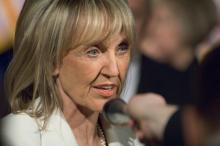jan brewer

“Never in my life has my very faith been called into question like this.”
That’s what young evangelical writer Jonathan Merritt told me this week. His statement followed a media firestorm, ignited when both he and Kirsten Powers, weighed in on proposed laws in Kansas and Arizona that would have allowed business owners to deny service to gay couples, based on conservative religious beliefs about homosexuality. Merritt and Powers each suggested that justifying legal discrimination against gay and lesbian couples might not be the best form of Christian outreach and raised consistency issues of whether discrimination would also be applied to other less than “biblical” marriages, or if just gays and lesbians were being singled out.
Their columns in both the Religion News Service and the Daily Beast have provoked intense responses from many Southern Baptists (where Merritt has his own heritage), those who call themselves Neo or “New” Calvinists, and other assorted critics from the political right.
Neither Merritt nor Powers took clear theological positions on all the sexuality issues involved. But both have been stunned by the responses from emails, tweets, and angry phone calls. The 1,200 Twitter notifications, messages, and calls from “leaders” that Merritt has received in the last few days include, “You only pretend to worship Jesus.” “You’re not a Christian.” “You are the enemies of Christianity.” “You’re marginalized now.” “You’re damaged goods.” “You’re on the outs now.”
Merritt and Powers were not questioning the gospel; they were “just asking whether we should discriminate against a whole group of people.” Both columnists believe Christians can honestly disagree on these complicated questions surrounding sexuality, but wanted to raise a discussion about whether passing laws that discriminate based on one religious point of view was wise, especially in this rapidly changing culture.

Today, two Christian leaders in Arizona delivered a petition signed by thousands of Christians to Gov. Jan Brewer calling on her to retract her controversial executive order denying driver’s licenses and other benefits to undocumented young people who qualify for deferred action. The petition was signed by members of the Sojourners community and reads:
We believe every person, regardless of immigration status, is created in God's image. Your recent executive order denying driver's licenses and other benefits to undocumented young people who qualify for deferred action is harsh and short-sighted. As people of faith, we urge you to reconsider your position and retract this executive order so that all God's children in Arizona can contribute to your state's economy and strengthen its communities.
Pastor Yvette Lopez of the New Life Church of God in Tucson, Ariz., also helped deliver the petition.
“I’m a conservative, but this is this was the last straw for me,” Lopez said.“This executive order is deplorable, and it must be rescinded; my faith and my politics demand this.”

President Barack Obama recently announced a policy change that would let young people living in the U.S. without immigration status pursue an education and find meaningful work without fear of deportation. As communities continue to suffer the effects of the country’s broken immigration system and families live in fear of their loved ones being deported, this was news to celebrate and an answer to prayer.
Apparently Jan Brewer, the governor of Arizona, had a different reaction to the compassion and progress embodied by this new policy. On the day it went into effect, Brewer issued an executive order denying driver’s licenses to young people in Arizona qualifying for the relief being offered by the federal government.